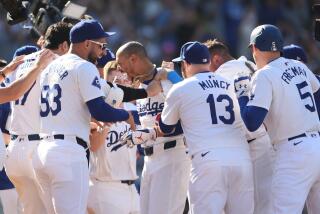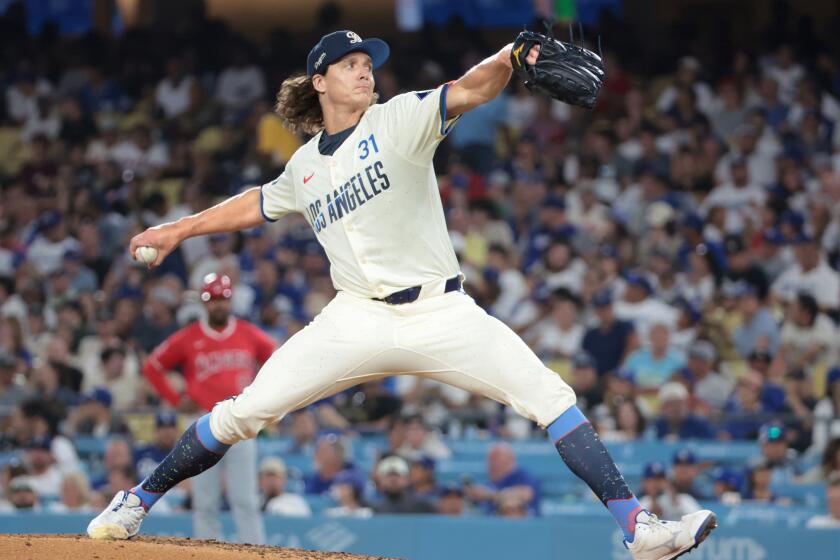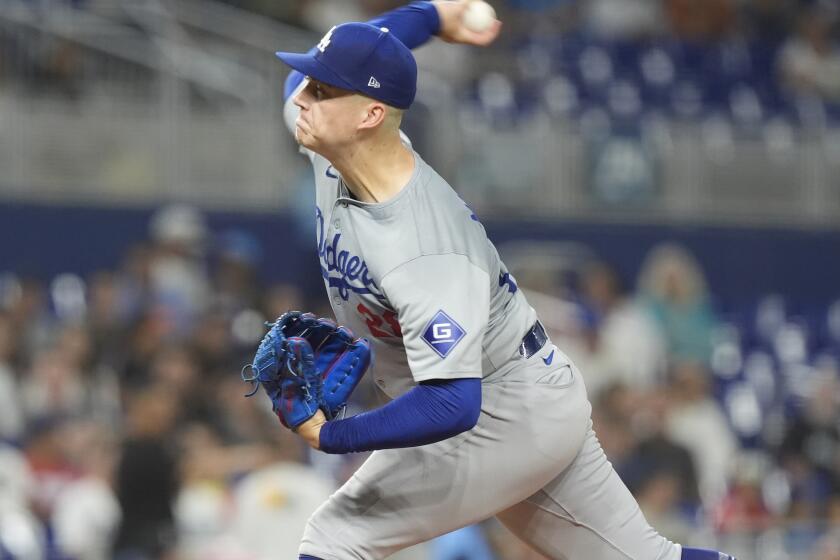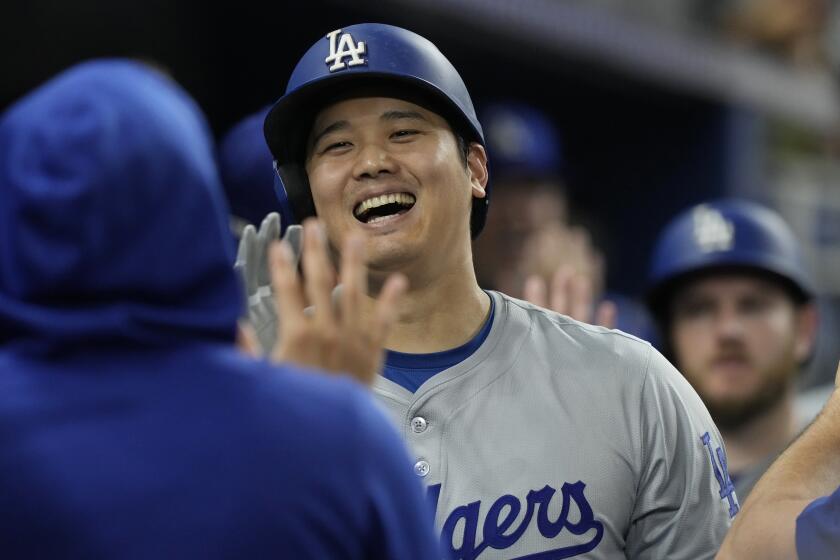Dodger Season Has Turned Into Sheer Sadness
By late Wednesday night, a season of Dodger baseball, such as it is, appeared to hang on Jim Tracy’s shoulders.
Postgame reflection in his office, where walls bear large photos of former managers, is Tracy’s charm. He strips the socks from his calves, one eye on a late game on the television, and recounts the decisions of the previous three hours.
If he had hit Olmedo Saenz in the eighth, what would Cardinal Manager Tony La Russa have done then? If Antonio Perez bunts, doesn’t Angel Manager Mike Scioscia walk J.D. Drew? If Mike Piazza is 2.1 seconds, glove to glove, and Tom Glavine won’t slide step, don’t you have to run Cesar Izturis there?
The third base coach, Glenn Hoffman, stops for a bottle of water and to say good night, and ends up on the couch for 45 minutes, drawn in. “Hoffy,” Tracy says, “you think La Russa pitches to Saenz in the eighth?”
So it goes, until the last writer shuffles off to deadline, and the last West Coast game is done, and the last load of laundry is in the dryer.
But, not Wednesday night. For the first time in a long time, no postgame session.
“Not tonight, guys,” he said with a sigh, almost apologetic. “It’s been a long, long day.”
It would be unfair to lay it all on the Milton Bradley drag; the roster is a mess, almost everyone is playing -- or idling on the disabled list -- to their reputation, the team is 13 games under .500, and a winnable division doesn’t look like it’s going to be won by the Dodgers.
But, neither is the Bradley drag unrelated to what appears to be organization-wide weariness.
Had Eric Gagne and Drew been healthy, had the free-agent pitchers thrown to their contracts, had the rest of the division still been awful, chances are the Dodgers could have withstood the occasional Bradley insubordination. They’d have had first place to console them, and maybe that would have placated Bradley, and maybe Jeff Kent never looks up from his motocross magazine.
But Bradley is gone, probably for good. It’s sad for Bradley, who had an organization rally behind him after the bottle-throwing and reporter-scuffle incidents. It’s sad for the Dodgers, who will find it difficult to move a good player whose personality is as unstable as his knee.
It is entirely possible Bradley was pushed into a corner by Kent, first to return faster from the finger injury that sat him down for two months, then to run harder on a knee that might have been unraveling by the inning.
Kent should have known Bradley wouldn’t react well to badgering, and here’s something to think about: Maybe Kent did. He had to see Bradley cracking, had to know Bradley’s reputation for responding poorly to criticism, yet Kent continued to ride him to a predictable outcome.
Now the Dodgers don’t have a switch-hitting outfielder with 25-homer, 100-RBI potential, Kent doesn’t have a protector in the lineup, and Bradley probably will be looking for work in a wary market, while rehabilitating his knee.
When it was revealed that Bradley probably would need surgery, and for the moment ignoring that Bradley would have been suspended anyway, Tracy said, “It’s just all part of the process as far as this year is concerned. It’s the way it has gone.”
Nobody, it seems, gets out for free.
The owner, Frank McCourt, on Wednesday addressed the team in the wake of the Bradley affair, a highly unusual mid-season strategy that suggested a lack of confidence in his general manager and manager to handle baseball affairs.
McCourt also has people in his ear pointing out deficiencies in Tracy and Paul DePodesta. There is nothing to say McCourt is listening, or that he is not. Tracy has another year left on his contract, though he can opt out after this season, and DePodesta has three years remaining, and neither makes big money in relation to their peers.
Turns out, there’s more to running the team than ribbon boards and cushy seats.
But, there will be plenty of long days in the Dodgers’ near future, so they should have the time to attend to their issues, wherever they may arise. McCourt apparently has discovered character as a noble trait, and if he’s going to be around the clubhouse anyway, Tracy ought to have him in for a postgame or two. Then we could all get back to the baseball, such as it is.
*
The Retake by the Lake
The Cleveland Indians have rebuilt from their six AL Central titles in seven years, through an 88-loss 2002, a 94-loss 2003 and an 82-loss 2004, to arrive alongside the Yankees and A’s with a month to go in the wild-card race.
The man leading the remodel is General Manager Mark Shapiro, who learned the business under John Hart and is bidding to make Cleveland a baseball town again. While they draw about 24,000 fans a game, more than only Kansas City, Tampa Bay and Florida, the Indians are 47-29 since June 4. They have an outside shot at running down the White Sox, whom they will play six times in the last two weeks of the season, and suddenly are challenging the Yankees, whose payroll is five times the Indians’ $42 million, for a playoff berth.
Of a process that began with their last postseason appearance, in 2001, to a redone roster and a return to the game’s competitive franchises, Shapiro said, “It only looks quick.”
From a team that won 91 games in 2001 then lost to the Mariners in the division series, from a team that drew three million fans for six consecutive seasons, Bartolo Colon was traded to the Expos for, among others, pitcher Cliff Lee and outfielder Grady Sizemore, and Chuck Finley was traded to the Cardinals for outfielder Coco Crisp. Einar Diaz and Ryan Drese were traded to the Rangers for slugger Travis Hafner.
So, probably before the Indians were done, Shapiro made them done. Interest in the Indians fell, so did the payroll, and so did attendance, but today Lee, Sizemore, Crisp and Hafner help make up a core of players who make the Indians relevant again. Young pitchers arrived with the young hitters, the kind of strategic overlap that has not occurred for small-market enterprises in Kansas City and Pittsburgh, everybody blossomed together, including Manager Eric Wedge, and now here they are.
“The decision in 2002 was to make those trades before it was evident to people on the outside that rebuilding was imminent,” Shapiro said.
Rather than play it out, lose free agents and build through draft picks, a process that cost the Twins, for example, years of contention, Shapiro was aggressive and lost only three seasons.
Dominican shortstop Jhonny Peralta came up through the system, as did Venezuelan catcher Victor Martinez. They’re both among the best in the league at their positions.
As they’ve all grown, Shapiro has come to love the fight in Hafner, Sizemore and Martinez, and found as a result their baseball is better than the total of their statistics.
“I’m a ‘human’ guy,” said Shapiro, who traded Bradley to the Dodgers before the 2004 season. “The beauty in the game is building a team, bringing together the personnel and the people, the smart, tough players that respect the game and are good teammates. You bring these kinds of players together, they play as a sum better than their talent.”
If only the people of Cleveland would notice.
“The most disappointing thing about this season,” Shapiro said, “is our fans haven’t come.”
*
Bats and Pieces
Colorado Manager Clint Hurdle, sitting Thursday in the visitors’ dugout at Dodger Stadium, on the perception that his ballclub is an easy mark: “Everywhere we go, people expect to sweep us. I heard that mumbling out of [the Dodger] dugout the other day. Well, good for you, then sweep us. It hasn’t worked out that way so far.”
The Rockies won Thursday night’s game, and two of three in the series.
Brad Penny said he has forwarded the week’s salary to the Florida batboy whom he goaded into trying to drink a gallon of milk in one hour, a stunt that cost the 19-year-old a week’s suspension.
Houston’s Jeff Bagwell, who had shoulder surgery in early May, hopes to return in time to play all of September, the first two weeks as a pinch-hitter and the final two weeks at first base. After thinking he might have to retire because of chronic shoulder pain, Bagwell, 36, believes he will be able to finish this season and play next season.
“That might be it,” he said.
Of the 29 home runs Randy Johnson has given up, 12 have come in 97 1/3 innings at Yankee Stadium, and six of them have been hit by the Red Sox. A sobering thought for Yankee fans: Johnson’s ERA in two starts at Fenway Park this season is 6.08.
Handicapping Derrek Lee’s triple crown chances:
The Cubs play 15 of their final 33 games at Wrigley Field, where Lee has hit .336 with 18 homers and 44 RBIs. He has actually hit better on the road, where, in virtually the same number of at-bats, he’s batting .369 with 19 homers and 47 RBIs.
More to Read
Are you a true-blue fan?
Get our Dodgers Dugout newsletter for insights, news and much more.
You may occasionally receive promotional content from the Los Angeles Times.










